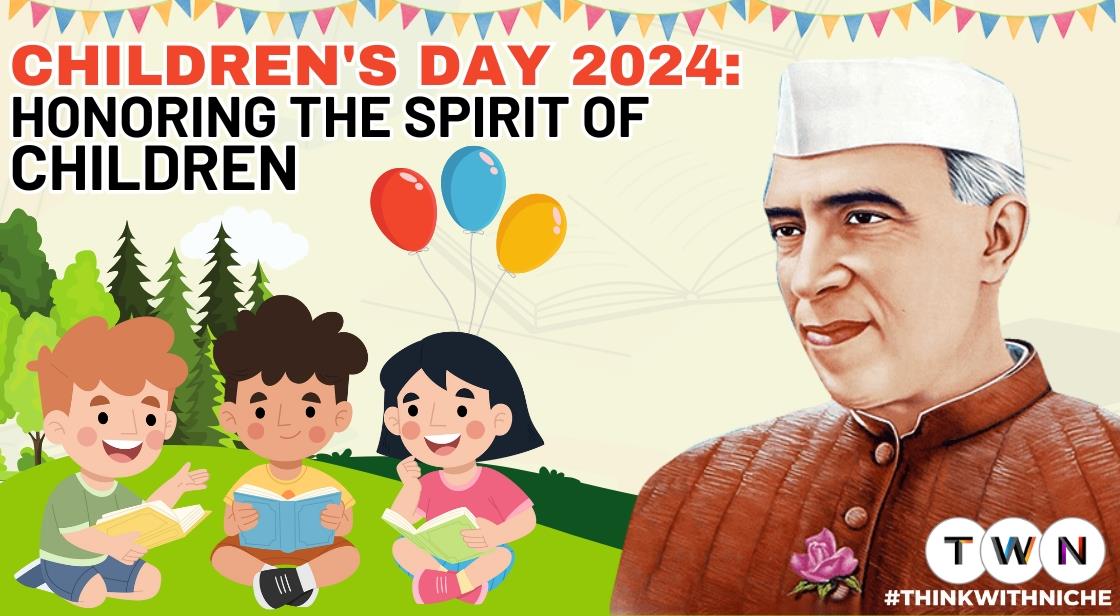Children's Day 2024: Honoring the Spirit of Children

Blog Post
Children’s Day in India is a joyous celebration dedicated to honoring the unique spirit of children and recognizing their critical role in shaping the nation’s future.
Observed each year on November 14, the day also commemorates the birth anniversary of Pandit Jawaharlal Nehru, India's first Prime Minister, who held a deep affection for children and saw them as the foundation of a progressive society.
Known as "Chacha Nehru" for his warm connection with young minds, he advocated for quality education and children’s rights, believing that nurturing future generations was key to building a strong nation.
On this special day, communities, schools, and organizations come together with enthusiasm to celebrate childhood, create awareness about children’s rights, and promote educational and welfare programs.
The festivities, ranging from cultural performances to awareness campaigns, provide children with a platform to express their creativity and potential.
They also serve as a reminder to society of its responsibility to foster a nurturing environment where every child has the resources and support they need to grow, learn, and thrive.
Children’s Day is more than a celebration; it’s a commitment to empowering India’s youngest citizens and carrying forward Nehru’s vision of a brighter, child-friendly future.
Celebrating Children's Day 2024
1. Introduction to Children's Day in India
Children's Day is a special occasion in India, celebrated with great joy and enthusiasm every year to honor the spirit of children and emphasize the importance of nurturing young minds. This day is dedicated to celebrating children, recognizing their unique talents, and reminding society of the vital role they play in shaping the nation’s future.
Date and Significance of Children’s Day in India
Children’s Day in India is observed on November 14 each year, commemorating the birth anniversary of Pandit Jawaharlal Nehru, the nation’s first Prime Minister. Nehru, affectionately called "Chacha Nehru" by children, held a deep affection for the young generation, recognizing their potential as the foundation of India’s future. He strongly believed that children’s well-being and education were essential for national progress, advocating tirelessly for quality education and the rights of children.
Celebrating Childhood and the Importance of Children’s Rights
Children’s Day provides an important opportunity to focus on the rights and well-being of children, reinforcing the ideals that Nehru promoted throughout his life. Recognizing children’s rights goes beyond just protecting them; it involves providing every child with opportunities for growth, development, and a healthy environment where they can thrive. Children’s Day encourages society to focus on these priorities, aiming to ensure that all children, regardless of background, have the resources and support they need to succeed.
Promoting Awareness for Children’s Well-Being
Through celebrations, campaigns, and events, Children’s Day raises awareness about the needs of children, such as education, health, and protection from exploitation. Schools and communities across India organize various activities like cultural performances, competitions, and educational sessions, helping children express themselves and build confidence. Meanwhile, NGOs and government bodies use the day to highlight issues affecting children, promoting initiatives that work toward a better future for all.
2. Historical Significance of Children’s Day in India
Origins of Children’s Day in India
Children’s Day in India, celebrated annually on November 14, is a tribute to the country's first Prime Minister, Jawaharlal Nehru, whose birthday coincides with this occasion. Known for his deep love for children, Nehru advocated passionately for their welfare, education, and rights, believing children were the nation’s future.
His affection for children earned him the endearing nickname “Chacha Nehru” (Uncle Nehru), and he became an iconic figure among young people, who looked up to him for his kindness and commitment to their growth. His emphasis on nurturing children’s talents, ensuring their well-being, and advocating for their development inspired the establishment of Children’s Day on his birthday after his passing in 1964.
Nehru's Vision for India’s Future
Jawaharlal Nehru’s vision for India was built around empowering the youth, who he believed were vital to the country’s progress. Nehru’s ideas on education extended beyond mere academic knowledge; he envisioned a holistic educational approach that included character building, moral development, and cultivating a sense of responsibility.
This outlook led to various reforms and the founding of institutions that still play a crucial role in India’s educational landscape today, such as the Indian Institutes of Technology (IITs) and the All India Institute of Medical Sciences (AIIMS).
Children’s Day as a Tribute to Nehru’s Legacy
Children’s Day in India is more than a day of celebration; it is a tribute to Nehru’s vision and ideals. Through this day, the nation reflects on the importance of investing in its children by fostering an environment that encourages learning, creativity, and character development. Schools, organizations, and communities across India hold events that align with Nehru’s goals, focusing on educational activities, storytelling sessions, and community programs that address children’s needs and rights. By observing Children’s Day, India not only honors Nehru’s legacy but also reaffirms its commitment to supporting, nurturing, and empowering every child to reach their full potential, keeping alive Nehru’s dream of a prosperous and progressive nation.
Also Read: Honoring Animal Rights on World Animal Welfare Day 2024
3. Celebrations and Activities Across India
Celebrations in Schools
Schools across India celebrate Children’s Day with enthusiasm, organizing various cultural events like plays, dances, and art competitions. Students participate in storytelling sessions, recitations, and talent shows, giving them a platform to showcase their creativity. Teachers also engage students with interactive activities and games, fostering a joyful learning environment.
Community Events and Festivals
Communities come together on Children’s Day to organize local events that celebrate the spirit of childhood. These include fun fairs, community plays, puppet shows, and sports events where children from different backgrounds interact and bond. Communities may also host exhibitions and workshops centered on children’s rights, promoting awareness of health, education, and safety.
Awareness Programs on Child Rights
On Children’s Day, special emphasis is placed on spreading awareness about children’s rights and welfare. Awareness programs, often organized by schools, NGOs, and local communities, cover important topics like child health, nutrition, and education. These sessions highlight the rights of every child to a safe and nurturing environment, fostering public consciousness and responsibility.
Government-Led Initiatives and NGO Events
The Indian government and various NGOs actively participate in Children’s Day celebrations. Government-led initiatives focus on promoting children’s education, safety, and development. NGOs such as Save the Children organize special events, campaigns, and interactive sessions to inspire positive change for underprivileged children.
Fundraising for Underprivileged Children
In some communities, Children’s Day serves as an occasion for fundraising activities aimed at supporting underprivileged children. Donations collected from charity events, fun runs, and bake sales go toward initiatives providing education, healthcare, and essential resources, ensuring a brighter future for disadvantaged children.
4. Educational Focus on Children's Day
Significance of Quality Education on Children's Day
Children’s Day in India not only celebrates the joys of childhood but also serves as a reminder of the importance of quality education, a core value championed by Jawaharlal Nehru. Nehru believed that investing in children’s education is crucial for India’s progress, and his vision continues to inspire efforts to provide equitable and empowering education for every child.
Government Schemes to Improve Education Access
To fulfill this vision, the Indian government has launched several initiatives aimed at making education accessible to all children. The Sarva Shiksha Abhiyan is one of India’s largest programs dedicated to achieving universal primary education. Another important initiative, the Midday Meal Scheme, provides nutritious meals to school children, encouraging attendance and supporting their physical and cognitive development. These programs address barriers to education, particularly for children from underprivileged backgrounds, and work toward a more inclusive education system.
Special Classes and Activities on Children’s Day
On Children’s Day, schools and educational institutions emphasize creative and interactive learning. Many schools organize storytelling sessions that bring to life inspiring tales and moral lessons. Skill-building workshops are conducted to encourage children to explore talents beyond the classroom, fostering skills like teamwork, problem-solving, and creativity. These activities not only make learning enjoyable but also aim to develop well-rounded individuals who are prepared for future challenges.
Children’s Day celebrations and educational initiatives together highlight the nation’s commitment to nurturing and empowering its youngest citizens through quality education.
5. Importance of Child Rights and Protection
1. Addressing Key Issues Facing Children in India
India faces pressing issues in child welfare, including child labor, malnutrition, and limited access to essential healthcare. Many children are forced into labor due to poverty, depriving them of education and basic rights. Malnutrition remains a widespread concern, affecting physical and cognitive development, while inadequate healthcare access jeopardizes their well-being and growth.
2. Government and NGO Initiatives for Child Welfare
Various government and NGO initiatives aim to improve children's lives. For Example, Beti Bachao Beti Padhao promotes gender equality by enhancing access to education and healthcare for girls. NGOs like CRY (Child Rights and You) and Save the Children work on the ground, tackling issues like education, health, and child protection. They provide resources and support to uplift vulnerable children, ensuring they receive the care and opportunities they need.
3. Significance of Child Rights Campaigns in Building a Better Future
These child welfare campaigns are vital for protecting and securing children's rights. By focusing on education, health, and safety, these initiatives lay the foundation for a brighter future. They work towards eradicating child labor, improving healthcare, and promoting gender equality, all of which help create a supportive environment where children can thrive and reach their full potential. Together, these efforts drive India closer to a future where every child’s rights are respected and upheld.
6. Quotes and Messages for Children’s Day 2024
1. Inspiring Quotes from Jawaharlal Nehru
-
Jawaharlal Nehru, fondly called "Chacha Nehru" by children, believed deeply in their potential and the value of nurturing them for the nation’s future. His famous quote, "The children of today will make the India of tomorrow," reflects his vision for young minds as architects of a progressive society. Nehru also said, “Only through right education can a better order of society be built up,” underscoring the need for quality education in empowering youth.
2. Quotes from Other Prominent Figures
-
Many renowned personalities have shared words of encouragement and wisdom for children. Dr. A.P.J. Abdul Kalam’s quote, “Dream, dream, dream. Dreams transform into thoughts and thoughts result in action,” inspires children to set big goals. Similarly, Nelson Mandela’s words, “Education is the most powerful weapon which you can use to change the world,” emphasize the role of knowledge in shaping a better future.
3. Heartfelt Messages for Children’s Day
-
Parents, teachers, and community members can use Children’s Day to share messages that uplift and motivate children. A heartfelt message might be, “Dear children, you bring joy and hope to the world. May you always find courage in your dreams and strength in your learning.” Another message could be, “On this Children’s Day, remember that each of you has unique gifts. Embrace your creativity, kindness, and curiosity—they are your greatest strengths.”
These quotes and messages highlight the value of education and the boundless potential within each child.
7. Looking Toward the Future: India’s Commitment to Children’s Welfare
India’s Progress Towards a Child-Friendly Nation
India has made significant strides in creating a supportive environment for children through various policies and programs aimed at their welfare. Initiatives such as the Right to Education Act, Midday Meal Scheme, and Beti Bachao Beti Padhao reflect a strong commitment to securing children’s education, health, and safety. The government, along with NGOs, works tirelessly to reduce child labor, ensure healthcare access, and promote education across the country, aiming to create a foundation that nurtures each child’s growth.
Role of Children’s Day in Driving Priorities for Child Welfare
Children’s Day serves as a powerful reminder for society and policymakers to continually focus on child welfare. This annual celebration spotlights the importance of child rights and compels us to examine the progress we’ve made while identifying areas for improvement. By marking this day with educational events and campaigns, society acknowledges its responsibility towards children and strengthens its commitment to uplifting the young generation.
A Vision for Future Generations
India’s vision for the future is centered on creating a thriving environment for all children, where each one has the resources and support needed to reach their full potential. This vision includes not only access to education and healthcare but also emotional well-being and social support. Through continued efforts and an unwavering focus on child welfare, India is working toward a future where every child is empowered, cherished, and equipped to contribute to society.
Conclusion: Celebrating Children's Day 2024 and Nurturing Future Generations
Children's Day 2024 serves as a poignant reminder of the importance of nurturing and empowering India's future generation. By honoring the legacy of Pandit Jawaharlal Nehru, who believed in the transformative power of education and children’s welfare, the nation renews its commitment to providing every child with the opportunities they need to thrive. Through education, healthcare, and rights protection, India continues its journey toward a brighter, more equitable future for all children.
You May Like
EDITOR’S CHOICE












